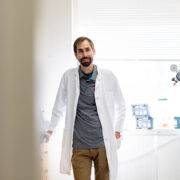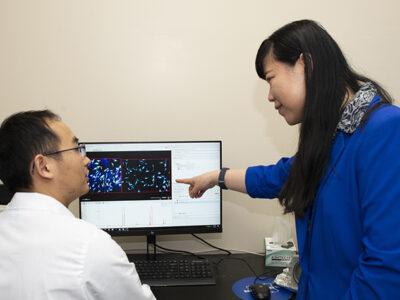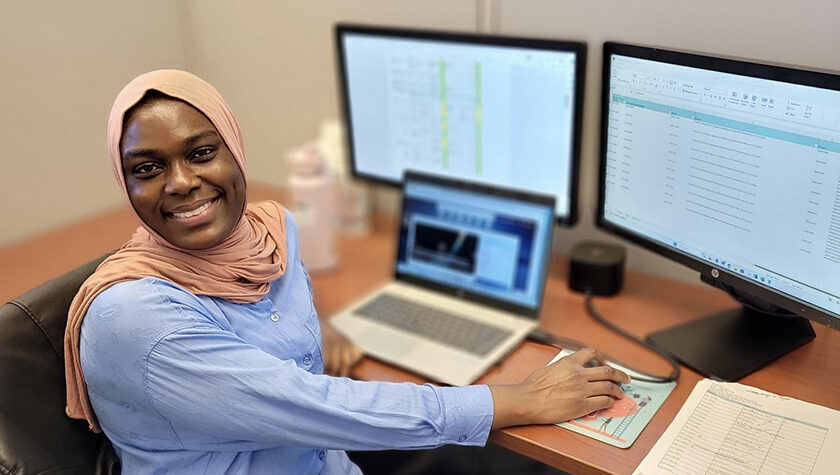
11
September

Unique industry internships and special projects augment graduate student experience in the Psychoactive Pharmaceutical Investigation and Applied Drug Development programs
By Katie Ginder-Vogel
The University of Wisconsin–Madison School of Pharmacy’s groundbreaking master’s degree programs in Psychoactive Pharmaceutical Investigation (PPI) and Applied Drug Development (ADD) are transforming the way students advance their careers in pharmaceutical sciences. Through a unique blend of coursework and hands-on experience — including internships and special projects — these programs offer students the opportunity to apply their skills in real-world settings, allowing them to build expertise that directly applies to their career goals.
Central to this approach are the School’s strong relationships with industry partners, which open doors for students to gain a breadth of professional experiences. These partnerships give students the chance to deepen their skills or explore new areas of interest, making them highly competitive in the job market and well-equipped to thrive in the evolving pharmaceutical industry. For some students, that looks like a summer internship, while others take on special projects at their full-time jobs to gain skills in a new area.
“There is no substitute for gaining real-world experience.”
—Cody Wenthur
“Students have the opportunity to apply what they’ve learned in their master’s courses to a professional role,” says Professor Eric Buxton, chair of the School’s Division of Pharmacy Professional Development and ADD program director. “Students find that growing their applied professional skills, like gaining hands-on lab experience, for example, can give them a leg up in getting a new job. This type of field experience expands opportunities and benefits students.”
Building industry relationships
From the outset, industry input has been integral to shaping the ADD and PPI master’s programs. When the ADD program launched, Buxton met with local, Madison-based companies, like LabCorp and Catalent, to ask what skills they valued and used that feedback as they built the curriculum. Today, Chris McIntyre, the employer liaison for graduate programs at the School of Pharmacy, continues to grow those relationships, even beyond Wisconsin’s borders.

These partnerships not only enrich the curriculum but also create pathways for students to gain hands-on experience through internships or special projects. In the ADD program, for example, students are required to complete a special project or internship as part of their studies at companies like Exact Sciences, LNK International, and Amneal Pharmaceuticals. Advisors guide students in developing goals for their projects, and weekly check-ins ensure that students are on track, sharing insights and challenges with their peers and mentors.
While internships aren’t a graduation requirement for master’s students in the PPI program, many choose to complete them as a way to gain on-the-job experience and build connections.
“There is no substitute for gaining real-world experience,” says Associate Professor Cody Wenthur, PPI program director. “Particularly for students seeking a career change, getting that first position during a career transition period is often the trickiest one, so demonstrating success in an internship can frequently be the key to opening up long-term career prospects that look a bit different from what you’ve done before.”
Pathway to quality control
For ADD master’s student Fatima Abdul Rasheed, an internship at Promega in the quality assurance and regulatory affairs departments provided an invaluable opportunity to explore a new career direction. After earning her PharmD in Hungary and practicing as a clinical pharmacist in Nigeria, Abdul Rasheed was eager to understand the drug development process beyond the pharmacy counter.
“In Nigeria, most of our drugs are imported, and I wanted to understand what goes on behind the scenes,” she says. “I’m a pharmacist, I dispense the drugs, but what happens from discovery to market? I wanted to learn about the work that goes into that product.”
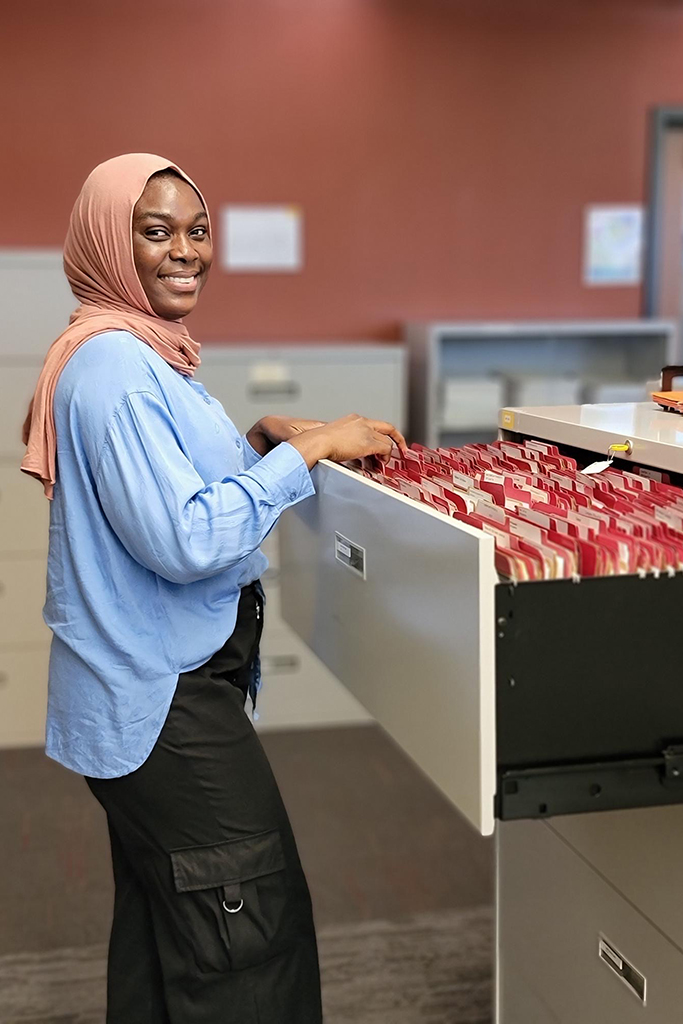
At Promega, Abdul Rasheed was responsible for handling documentation and training staff, ensuring that the company adheres to FDA standards.
“My background as a pharmacist helps me ensure people are getting the best quality products, and it gives me joy that my work is producing something good for people who use our products,” she says.
Her experience was so positive that she’d like to work in quality control full-time, ideally at Promega.
“Promega is a very good company, and as an international student, this is my first American corporate experience,” she says. “My manager provided guidance and independence, which helped me learn.”
The most rewarding part of her internship has been getting to know longtime Promega employees and learning about the company’s history.
“Learning how my colleagues started departments from scratch and how things have grown has been the best part of this experience,” she says.
Abdul Rasheed appreciates the guidance, experience, and connections she and her cohort of master’s students have received from the ADD program.
“When you graduate from the ADD master’s program, you can use your knowledge in real life,” says Abdul Rasheed. “I want to take that knowledge back home to Nigeria and help.”
Expanding expertise
Through their internships, PPI master’s students gain experiences across the scope of pharmaceutical development, from applying for research grant funding to patenting psychedelic therapeutics.
For her internship, PPI student Natasha Sanchez is working as a documentation specialist at Lin-Zhi International in Santa Clara, California — a manufacturer of in-vitro diagnostic reagents to screen for drugs of abuse. Her role is to ensure all documents used for production are current, properly identifiable, and traceable, while liaising with various other groups, including the production, quality control, and regulatory teams, as well as the vice president of operations.
Previously a pharmacy technician, Sanchez became curious about what goes on before medications reach the counter and began looking into the biopharmaceutical industry.
“I’m consistently impressed by the amount of responsibility students are given by their employers. This applied skills experience provides our students with a competitive edge.”
—Eric Buxton
“My goal is to explore my interests and expand my knowledge, while gaining as much experience working in the biopharmaceutical field as possible,” she says. “I enjoy the flexibility of being a hybrid employee, which allows me to focus on my PPI master’s program, which I complete remotely, while caring for my family and providing for them.”
Motivated by her company’s impact on people struggling with substance abuse disorders, she’s found her work deeply meaningful.
“I have family members dealing with substance abuse disorders, and working with this company makes me feel useful and like I can make a difference,” she says.
Similarly, fellow PPI master’s student Nicholas Panico has taken on a special project at his company, Symbio Proinnovera — a clinical research organization in Port Jefferson, New York — that’s outside of his full-time job scope as a scientific and regulatory affairs specialist. Panico is working on an investigational new drug (IND) application for a novel nano-CBD formulation, gathering chemistry, manufacturing, and control data from clients and vendors. Panico’s bachelor’s degree is in bioprocess engineering and his past four years of work include experience in manufacturing, medical writing, and regulatory affairs.
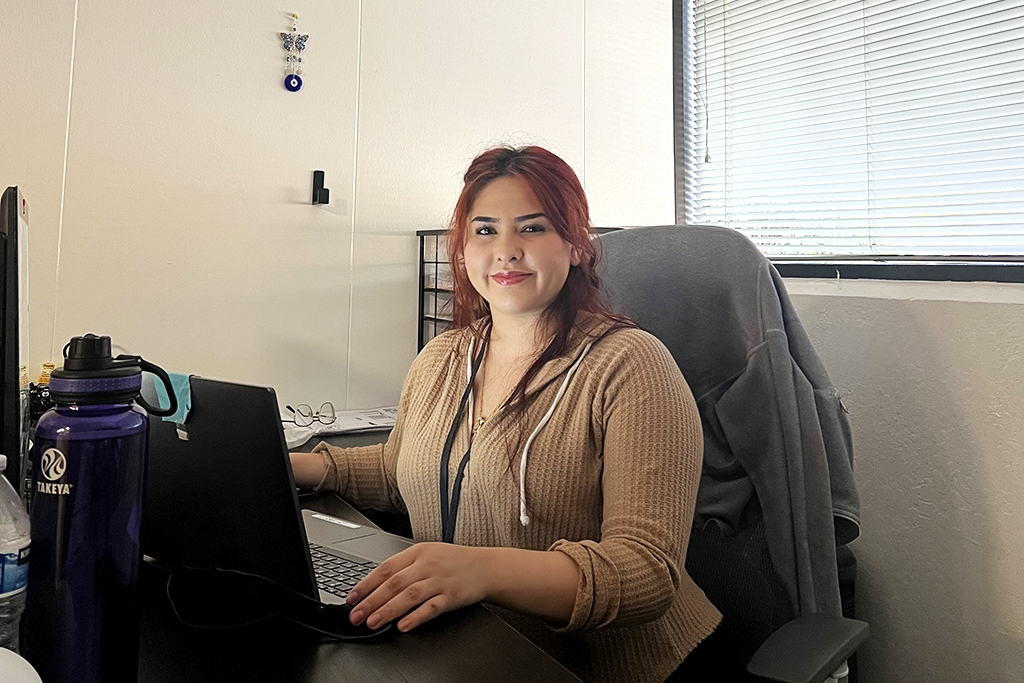
“I do regulatory affairs work, but we typically do not write submissions like I am doing for this particular project,” he explains. “I’m working on the briefing package for the Pre-IND meeting with the FDA. To do this, I communicate with our client, perform literature research, and read FDA guidance and data on similar drugs/projects that are currently approved.”
The goal is to eventually get an IND approved for the company’s planned Phase 1 CBD study.
“I enjoy the challenge of the work I’m doing and the leeway I’ve been given to make decisions regarding it,” Panico says.
Evolving curriculum and expanding partnerships
As the ADD and PPI master’s programs continue to grow, and the relationships between the School of Pharmacy and employers develop further, the types of applied work students take on will also evolve.
“We have been fortunate to have great partnerships with organizations across the field of psychedelic medicine, which have provided our students with experiences that range from patent analysis to drug development to patient advocacy and policy to clinical operations,” Wenthur says. “Internships allow us to keep in touch with the ongoing needs of the field and meet demand at its source by connecting our extraordinarily talented and passionate students with the companies and organizations that are leading the vanguard for psychoactive pharmaceutical investigation.”
Buxton says he’s always impressed by the breadth of what students take on in the professional component of the master’s programs.
“It’s fun to watch the students grow and see their excitement — some students say that’s why they chose this program,” says Buxton. “I’m consistently impressed by the amount of responsibility students are given by their employers. This applied skills experience provides our students with a competitive edge.”



